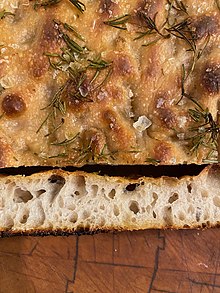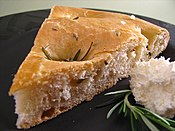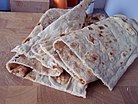Focaccia
 | |
| Type | Flatbread |
|---|---|
| Place of origin | Italy |
| Main ingredients | High-gluten flour, oil, water, salt, yeast |
Focaccia (UK: /fəˈkætʃə/ fə-KATCH-ə, US: /foʊˈkɑːtʃ(i)ə/ foh-KAH-ch(ee-)ə, Italian: [foˈkattʃa]; Ligurian: fugassa, Ligurian: [fyˈɡasːa]; Barese: fecazze, Neapolitan: [fəˈkattsə]) is a flat leavened oven-baked Italian bread.[1] In Rome, it is similar to a type of flatbread called pizza bianca (lit. 'white pizza').[2][3][4] Focaccia may be served as a side dish or as sandwich bread and it may be round, rectangular, or square shape.
Etymology
[edit]
In ancient Rome, panis focacius[1] was a flatbread baked on the hearth.[5] The word is derived from the Latin focus, 'hearth, place for baking'.[6] The basic recipe is thought by some to have originated with the Etruscans, but today it is widely associated with Ligurian cuisine,[citation needed] while outside Liguria the word usually refers to the Genoese variants.[7]
The first attestation of the word focaccia dates back to the 14th century.[8]
Focaccia is sometimes considered to be a variant of pizza in publications outside Italy,[a] although focaccia is left to rise after being flattened, while pizza is baked immediately.[b]
Regional variants
[edit]Ligurian variants
[edit]Focaccia genovese
[edit]
Focaccia genovese (lit. 'Genoese focaccia'), marked by its finger-sized holes on its surface called dimples(ombrisalli in Genoese dialect),[11] is brushed or sprinkled with olive oil, coarse salt, and sometimes water before the final rise.[11][12]
In Genoa, focaccia is eaten in the morning at breakfast or during the day. It is often dipped in milk or in cappuccino at breakfast and eaten warm and wet.[11]
Other Ligurian variants
[edit]
Focaccia has countless variations along the Ligurian coast, from the biscuit-hard focaccia secca (lit. 'dry focaccia') to the corn-flour, oily, soft Voltri version.[13][14]
An extreme example is focaccia con il formaggio (lit. 'focaccia with cheese'), also called focaccia di Recco or focaccia tipo Recco, which is made in Recco, near Genoa. This version has stracchino cheese sandwiched between two layers of paper-thin dough.[15]
Other variants
[edit]In northwest Italy, a popular variant is focaccia dolce (lit. 'sweet focaccia'), which is sprinkled lightly with sugar, and may include raisins or honey.[16] In northeast Italy, focaccia veneta (lit. 'Venetian focaccia') is typical for Easter; it is based on eggs, sugar, and butter. In the city of Rimini,[17][18] piada dei morti is a sweet focaccia topped with raisins, almonds, walnuts, and pine nuts,[19][20] and traditionally eaten in November for All Souls' Day.[18][19]
In South Tyrol and the Austrian village of Krimml, Osterfochaz (locally Fochiz) is a traditional Easter gift from godparents to their godchildren. It is made slightly thinner in the centre so that dyed eggs may be placed there.[21]
The traditional variant from Bari, focaccia barese, is prepared with durum wheat flour and topped with tomatoes.
Focaccia al rosmarino
[edit]Focaccia al rosmarino (lit. 'rosemary focaccia') is topped with rosemary.[9][22][23][24] It may be served as an antipasto, table bread, or snack.[25][26][27][28] Whole or sliced fresh rosemary leaves may be used,[22] as can dried rosemary.[29] It may be garnished with sprigs of fresh rosemary, after baking,[23] and sprinkled with salt.[29] Potato rosemary focaccia is often called "potato pizza" in New York City.[30]
Although rosemary is the most common herb used to flavor focaccia,[31] sage is also used, and the variant is called focaccia alla salvia.[23]
Focaccia al rosmarino may have a moist texture, and the exact recipe varies.[32] It may be savory or sweet.[32] It typically is baked, although it is sometimes fried.[32] Garlic[22] or basil may be added.[33] It is sometimes served accompanied with slices of prosciutto.[34][35] It may be used in the preparation of sandwiches.[24][36]
-
A close-up view of focaccia al rosmarino
-
Slices of focaccia al rosmarino
See also
[edit]![]() Media related to Focaccia at Wikimedia Commons
Media related to Focaccia at Wikimedia Commons
![]() Focaccia II at the Wikibooks Cookbook subproject
Focaccia II at the Wikibooks Cookbook subproject
Notes
[edit]- ^ "Focaccia with Rosemary; Yield: 1 (12-inch [30cm]) pizza"[9]
- ^ "What is the main difference between pizza and focaccia? The flattening of the dough, how long you take to roll out the dough, as well as the cooking time. Focaccia sits and rises before being baked. It is only put in the oven when the dough finishes rising. Pizza is placed in the oven immediately." – Gabriele Bonci[10]
References
[edit]- ^ a b "Panis focacius". Archived from the original on July 12, 2017. Retrieved December 30, 2008.
{{cite web}}: CS1 maint: unfit URL (link) - ^ Riolo, A. (2012). The Mediterranean Diabetes Cookbook. American Diabetes Association. p. 260. ISBN 978-1-58040-483-9.
- ^ Fraioli, J.O. (2009). Pizza & Wine: Authentic Italian Recipes and Wine Pairings. Gibbs Smith, Publisher. p. 81. ISBN 978-1-4236-1250-6.
- ^ Simonis, D. (2010). Italy. Country Guide Series. Lonely Planet. p. 150. ISBN 978-1-74220-352-2.
- ^ "A Short History of Focaccia Bread". Big History. WordPress. Retrieved March 22, 2012.
- ^ Oxford Latin Dictionary. Oxford: Clarendon Press, 1982, 1985 reprinting, p. 718.
- ^ Liguria!, That's (May 3, 2016). "Focaccia genovese, the taste of Liguria! | That's Liguria!". Retrieved December 24, 2020.
- ^ Toso, Fiorenzo (2015). Piccolo Dizionario Etimologico Ligure - L'origine, la storia e il significato di quattrocento parole a Genova e in Liguria. Zona. ISBN 9788864385778.
- ^ a b Whitson, C.; Gjesteland, T.; Widen, M.; Hansen, K. (2015). Passion for Pizza: A Journey Through Thick and Thin to Find the Pizza Elite. Agate Publishing, Incorporated. p. pt419. ISBN 978-1-57284-746-0.
- ^ Whitson, C.; Gjesteland, T.; Widen, M.; Hansen, K. (2015). Passion for Pizza: A Journey Through Thick and Thin to Find the Pizza Elite. Agate Publishing, Incorporated. p. pt73. ISBN 978-1-57284-746-0.
- ^ a b c Rossi, Sergio (2013). Focaccia genovese. Genova: Sagep. ISBN 978-88-6373-258-0. OCLC 956047034.
- ^ Massimo Alberini, Giorgio Mistretta, Guida all'Italia gastronomica, Touring Club Italiano, 1984, p. 192.
- ^ "La focaccia di Priano: una delle più buone in assoluto - Mentelocale". January 20, 2015. Archived from the original on January 20, 2015. Retrieved December 24, 2020.
- ^ "Focaccia di Voltri". Oggi - Cucina (in Italian). Retrieved December 24, 2020.
- ^ "Focaccia di Recco". Academia Barilla. Retrieved November 9, 2018.
- ^ "Focaccia Bread". Archived from the original on May 3, 2012. Retrieved March 22, 2012.
{{cite web}}: CS1 maint: unfit URL (link) - ^ Santini, Enrico (October 29, 2023). "La Piada dei Morti di Rimini, qual è la migliore?" [Rimini's piada dei morti: Which is the best?]. Chiamami Città (in Italian). Retrieved February 17, 2024.
- ^ a b Nardi, Grazia (May 12, 2020). ""An cnusémie al fèsti"" [What they left us]. Rimini Sparita (in Italian). Retrieved February 17, 2024.
- ^ a b Lazzari, Martina (October 29, 2023). "Piada dei morti, preparazione e curiosità sulla dolce "piadina" romagnola" [Piada dei morti: Preparation and curiosity about the sweet Romagnol "piadina"]. RiminiToday (in Italian). Retrieved February 17, 2024.
- ^ "Piada dei morti ricetta dolce facile romagnolo per il 2 Novembre" [Easy recipe for sweet Romagnol piada dei morti for 2 November]. Giallo Zafferano (in Italian). October 31, 2017. Retrieved February 17, 2024.
- ^ "Ostern" [Easter] (in German). Familien feiern Feste. Archived from the original on September 25, 2018. Retrieved September 24, 2018.
- ^ a b c Bertoli, F.B.; Mauriello, F.M.R. (2011). From a Rectory Kitchen. XULON Press. p. 15. ISBN 978-1-61904-695-5.
- ^ a b c Orsini, G.; Orsini, J.E. (2007). Italian Baking Secrets. St. Martin's Press. p. 113. ISBN 978-0-312-35820-4.
- ^ a b Deseran, S.; Weaver, J. (2013). Picnics: Delicious Recipes for Outdoor Entertaining. Chronicle Books LLC. p. 21. ISBN 978-1-4521-2848-1.
- ^ "In via Saluzzo un locale consacrato al mollusco". La Stampa (in Italian). November 2, 2015. Archived from the original on March 6, 2016. Retrieved March 4, 2016.
- ^ Rossi, L.; Verdi, D.; Gialli, G. (2014). Ricette del giorno: Antipasti (in Italian). Bibliotheka Edizioni. p. pt41. ISBN 978-88-98801-59-6.
- ^ Klein, D.M. (2001). The Mediterranean Vegan Kitchen: Meat-free, Egg-free, Dairy-free Dishes from the Healthiest Place Under the Sun. HP Books. p. 191. ISBN 978-1-55788-359-9.
- ^ Marcangelo, J.; Birch, C. (1984). Italian Vegetarian Cooking. Inner Traditions/Bear. p. 94. ISBN 978-0-89281-343-8.
- ^ a b Desert Island Dishes. Infinite Ideas Series. Infinite Ideas. 2012. p. 32. ISBN 978-1-908984-16-6.
- ^ Reinhart, P. (2010). American Pie: My Search for the Perfect Pizza. Potter/TenSpeed/Harmony. p. 235. ISBN 978-1-60774-090-2.
- ^ Sauvage, J. (2015). Gluten-Free Wish List: Sweet and Savory Treats You've Missed the Most. Chronicle Books LLC. p. 59. ISBN 978-1-4521-4389-7.
- ^ a b c The Illustrated Step-by-Step Cook. Look & cook. DK Publishing. 2010. pp. 392–393. ISBN 978-0-7566-7507-3.
- ^ Barnett, A. (1996). Examining Food Technology. Examining Food Technology Series. Pearson Education. p. 44. ISBN 978-0-435-42062-8.
- ^ Mib, Ftse. "Focaccia al rosmarino e prosciutto". Ticino News (in Italian). Archived from the original on March 7, 2016. Retrieved March 4, 2016.
- ^ "Spuntini veloci: focaccia con fichi e caprino" (in Italian). Blogo. September 20, 2011. Archived from the original on January 23, 2019. Retrieved March 4, 2016.
- ^ Madison, D. (2014). The New Vegetarian Cooking for Everyone. Potter/TenSpeed/Harmony. p. pt391. ISBN 978-1-60774-554-9.
Further reading
[edit]- Pane, pizze, focacce e torte salate. Voglia di cucinare (in Italian). Giunti Demetra. 2010. p. 229. ISBN 978-88-440-3944-8.




